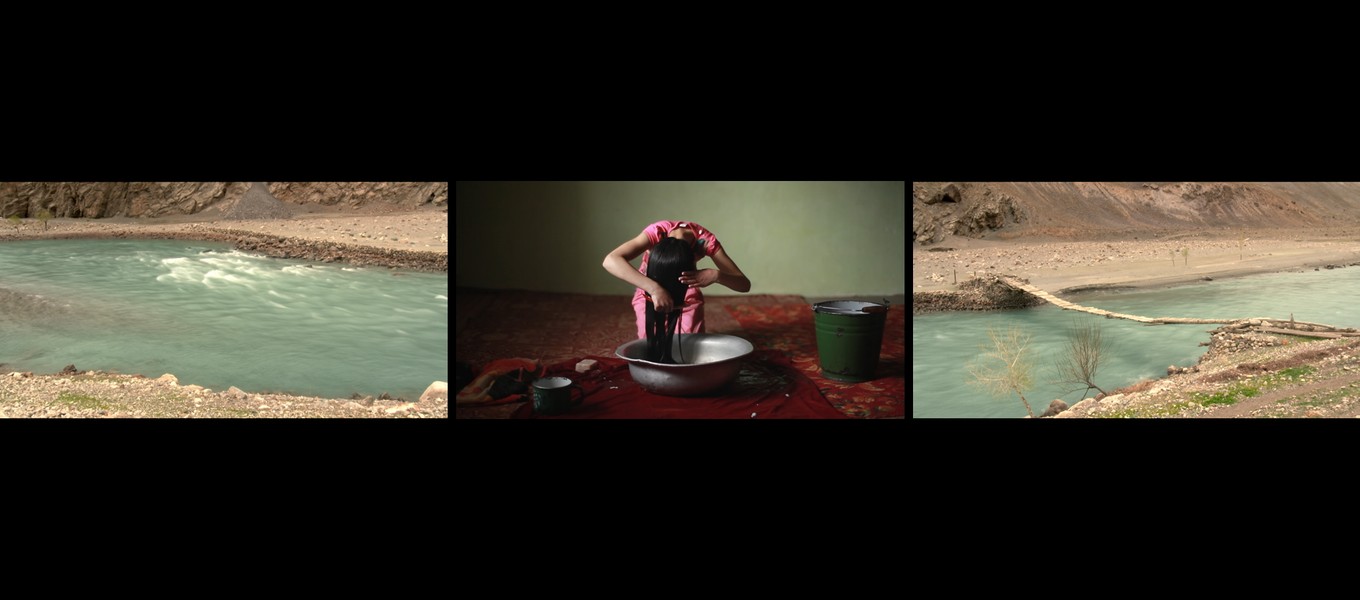Saodat Ismaïlova
Stains of Oxus - Installation - 2016
présentée dans le cadre de l'exposition Indices d'Orient La mémoire, le témoin et scrutateur -



Installation
Stains of Oxus is a multi-screen audio video installation that evokes an oneiric journey through the greatest Central Asian river, Amu Dariya – known in Greek times as Oxus, portraying the transformation of landscape and witnessing people who inhabit its riverbanks, beginning from the high plateau of Tajikistan to the lowland deserts in Uzbekistan where the river finds its end. A collection of dreams that is by local tradition shared with flowing water, and practiced as a first morning ritual, is now captured and revealed on the screen. The images and sounds choreographically edited along documented testimonies, landscape and life styles creating a narration within the screens. We encounter people of different ages in different villages that stand on the banks of the river. The sacred dreams of the protagonists, which they have once whispered to and shared with the river, will become a compelling core of the installation. The portrayed local people of the triptych, who are revisiting their dreams and destinies, now become themselves the reimagined Oxus. As voices confess their dreams in an unconscious flow, so does the river that vibrates uniting countries, cultures, languages, religions and traditions on its way from one of its sources in Bulunkul Lake in Murgab to its death in the Aral Sea, Karakalpakistan.
Born in 1981 in Tashkent, soviet Uzbekistan, graduated from Tashkent State Art Institute (Uzbekistan). Her art work is devoted to bring to surface Central Asia’s soul by creating modern myths catapulted with the recent past of the region. While inspired by old myths and beliefs, she builds bridges between past and present, retracing back a spiritual past that is fading, sewing back forgotten and recollected stories of parallel visions between imaginary, mythical characters and concrete historical figures as well as translating these stories into modern audiovisual art projects with a stress on the female world. Saodat Ismailova comes from a documentary and narrative cinema background and now works in audiovisual art forms, often referring to archives and anthropology. Saodat Ismailova participated with her work in the Cannes Film Festival, the Berlinale, the Berlin International Film Festival, the Venice Art Biennale, the Edinburgh, and the Seattle International Film Festivals, among many others. She is currently working in Tashkent, Uzbekistan, and in France, where she is a student at Le Fresnoy - Studio national des arts contemporains.
Production
Acknowledgments
Gayane Umerova Shagarf Sherzad Mullo Abdullo Abduvali Bakhtaliev Tursun Ismailova Safarboy Gurlenlik Djanboz Dushanbiev Mansura Mualibshoeva Asansho Mualibshoev Fazlon Mualibshoev Soheba Davlatshoeva
